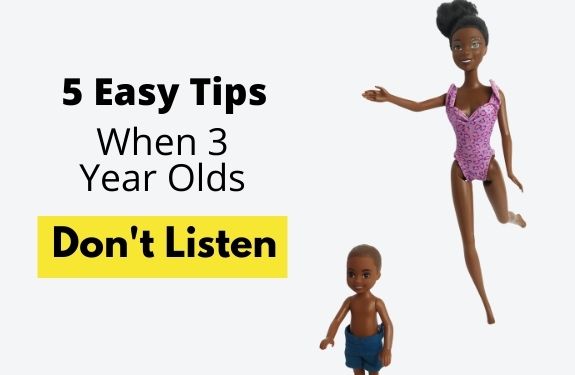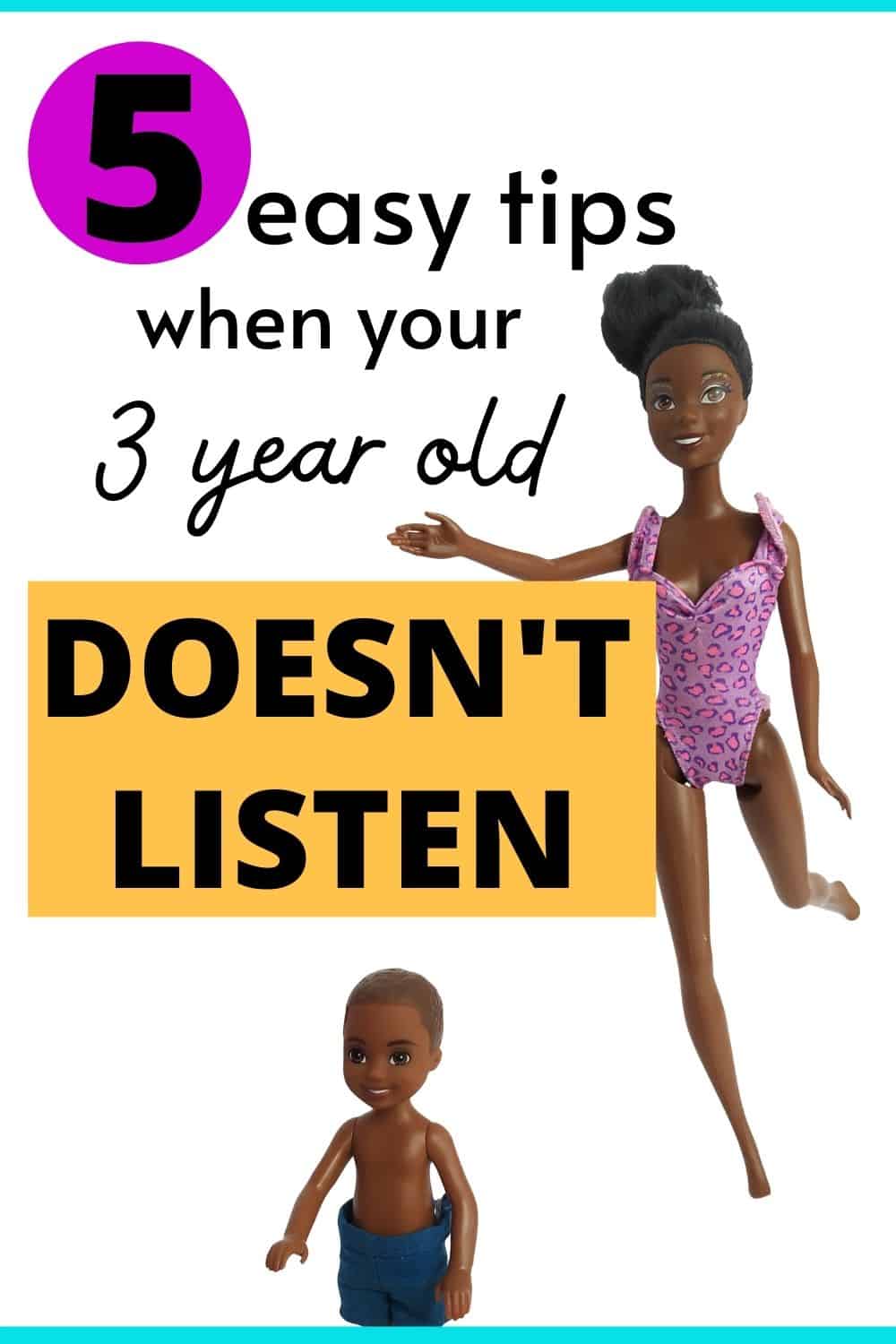Inside: 5 easy tips when your 3 year old doesn’t listen to have less peace and more frustration. This post contains affiliate links which means if you make a purchase I may receive a small commission, at no extra cost to you. Privacy policy here.
What To Do When Your 3 Year Old Doesn’t Listen
Having a 3 year old can be wonderful but also oh so tough.
Whether you’re trying to get them to brush their teeth, pick up their toys, or stay next close when you strap the baby in the car seat it can be really hard to get 3 year old’s to listen.
3 year olds don’t always listen, but sometimes we really need them to. Let’s take a look at some ways you can get them to listen without having to get frustrated in the process.

Why Don’t 3 Year Olds Listen?
Wouldn’t it be nice if 3 year olds listen?
At 3 years old it feels like they should be able to listen. Suddenly their language abilities have drastically increased and they seem to comprehend almost anything you say.
But following up with what you say? Not so much.
Your 3 year old might be able to understand what you’re saying and sometimes follow instructions, but when your 3 year old doesn’t listen that’s probably because they’re still too young.
They’re not deciding to defy you, but they are still at an age where they can get distracted, have limited self control, are still figuring out their independence, etc.
These tips will help you build a foundation for listening and respect that will last a lifetime, but it’s important to understand right now that at 3 years old listening isn’t easy and they’ll need a lot of help from you.
It’s important though to have reasonable expectations of your child, it’s possible your 3 year old doesn’t listen because you’re asking them to do something that they’re just not old enough to follow through with yet.
The Best Tips When a 3 Year Old Doesn’t Listen
#1. Don’t over ask
Do you remember when your child first turned 2 and they were always trying to gain some independence? They wanted to do things on their own, without your help?
It’s an important part of human development for children to develop their autonomy and independence, and at 3 years old it’s still happening.
When you’re constantly telling them what to do it can take away their feelings of independence because suddenly you’re controlling them.
So beware of asking too much of your 3 year old, because they might decide not to listen in a moment where it’s really important that they do.
You can avoid over asking in a few ways:
- Give them meaningful choices (ex. What to wear, what to do first, etc). As long as you’re ok with whichever choice they make.
- Avoid overtiredness and overstimulation where you’ll end up having to ask a lot of them because they’re acting out due to that
- Tell them what they should do instead of what not to do (ex. “Come jump over here” instead of, “Get off the couch.”)
#2. Listen to them
Just as much as you think it’s important for your 3 year old to listen to you, it’s also important for you to listen to them.
It’s no surprise if a 3 year old doesn’t listen because they feel no one is listening to them.
Ask them their thoughts or sit down to play with them and really pay attention to listen to them in those moments and build connection (an important part of gentle parenting).
Also be sure that when they ask you to do something you respond in a way that you wish your child would. Sometimes there is an “easy yes” that a child asks – such as asking to turn on some music. It’s an easy thing to do that probably doesn’t hurt anyone, but if you’re busy you might default to just saying, “No.”
Make sure to embrace those easy yes moments – it usually takes very little energy from you but it shows your child that you are listening to them.
Finding ways to listen to your child will make it easier for them to listen to you.
Even when you have to say no to their request you can still do so in a kind, loving way so they know you were listening.

#3. Give a reason
This is a good habit to get into because it’s a very respectful to your child to give a reason for why you’re asking them to do something.
Have you ever worked somewhere or been part of something where there was a rule that seemed totally pointless? Even as an adult it can be incredibly hard to follow rules if you don’t know why they’re there.
Whenever possible, give your child a reason for why you’re asking them to do something, even if you have to give the reason after the fact.
One trick some parents use is to ask their child, “What’s my job?” and their response is, “To keep me safe.” This would be in instances where maybe the child needs to hold the parents hand. This is a smart way to remind the child of the reason why you’re asking them to do something.
Some of the reasons you give them might be hard for them to understand when they’re just 3 years old, but it’s good to get in the habit of this. When they’re a teenager it will be even more important to give reasons behind your rules.
#4. Walk them through the task
If your 3 year old doesn’t listen after you’ve asked them to do something you can always intervene immediately.
Immediate intervention helps to teach them that eventually they will need to do what you’ve said – it can’t be avoided.
You can then walk them through the steps it takes to do the task. This doesn’t mean that they’re in trouble and you need to be frustrated that they didn’t listen, take this as a moment to acknowledge that they need your help, and since you’re their coach, you’re going to help them.
A great phrase to use is, “I see you’re having trouble with ____. I am going to help you.”
#5. Make it fun
Your 3 year old will listen more easily if you are able to make your instructions fun and interesting.
You can use a sing-song voice, do a little dance, turn it into a game – anything like that tremendously helps 3 year olds to listen.
This can help especially for tasks they need to do but don’t enjoy doing such as brushing their teeth. There are a lot of great videos on YouTube to help kids enjoy brushing their teeth, or you could pretend there are little animals in their mouth the brush has to get out, or make the toothbrush talk to them.
Adding some fun can make certain tasks way easier for them to follow through with.
Have reasonable expectations of 3 year olds
In the majority of society there can be this huge expectation for children to do things that they’re just not developed enough to be able to do, and this can result in frustrated parents feeling like they’ve failed their kids, or becoming really strict to get their kids to meet these unrealistic expectations.
Here on this website I promote gentle parenting, and as an early childhood educator I know the importance of being aware of your child’s development.
You can learn more about your 3 year old’s development here.
Keep in mind though that no two people are the same. Just because it seems like the other little kids can sit still and listen during read aloud at the library doesn’t mean that it’s something your 3 year old can do (yet).
It’s important not to ask them to do things that you know they’ll struggle to follow through, but it’s also an unreasonable expectation to take them to certain places and expect them to behave a certain way.
Not all 3 year old’s can be quiet at the library or trying to run away when you’re at the playground. Sometimes it’s best to avoid these places when you know they will struggle to listen to you when you’re there. It doesn’t mean that they’re a bad kid, you’re just being respectful of what they’re capable of.
Conclusion of 5 Tips When Your 3 Year Old Doesn’t Listen
As you can see from the 5 easy tips it’s certainly possible to help your 3 year old who doesn’t listen.
Apply these tips along with other gentle parenting practices and you might start to see a huge change in your home.
If you know you get really frustrated when they don’t listen you might be interested in this article or this course to help you learn to regulate your own emotions.

More Posts About 3 Year Olds
The Best Guide to 3 Year Old Tantrums
